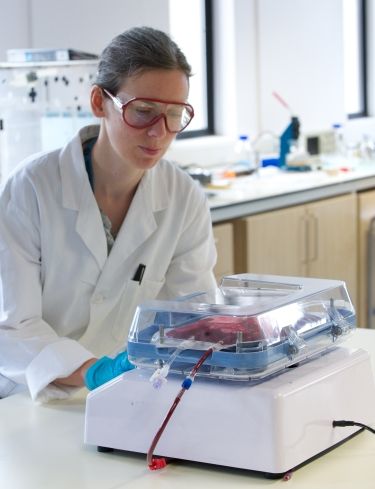New device recovers blood from major surgery to return to patient
22 August 2012
Pioneering technology developed at the University of Strathclyde recovers blood spilled during open-heart and major trauma surgery and concentrates the blood cells for transfusion back to the patient.
This process, known as autotransfusion, reduces the volume of donor blood required in surgery and the problems associated with transfusion reaction.
The device consists of a blood bag which employs a chemical sponge technology and a mechanical agitator to concentrate blood sucked from the surgical site or drained from the heart-lung machine after the surgery. The separated cells are then returned to the patient by intravenous transfusion.
The HemoSep device has gained the CE mark and received Canadian national approval, following successful clinical trials in the University of Kirikkale University Hospital in Ankara, Turkey.
Professor Terry Gourlay, who led the development of the technology at Strathclyde University’s Department of Biomedical Engineering, said, “The introduction of HemoSep to the medical device field will make a significant difference to people’s lives and greatly reduce the cost and risks associated with blood transfusions. The technology has distinct advantages over traditional techniques which are not only costly but technically challenging and involve the use of a complex centrifuge and pumping apparatus by specialist technicians.
“We expect further developments in the form of a derivative of this technology for use in children undergoing open-heart surgery where the challenges of blood conservation are even more critical.”

In the clinical trials, carried out in over 100 open-heart surgery operations, the use of the HemoSep device significantly reduced the need for blood transfusions together with preservation of normal clotting mechanisms and a reduction in the inflammatory reaction often encountered after such surgical procedures.
Professor Serdar Gunaydin, Head of Cardiac Surgery at the University of Kirikkale where the trials were conducted, said: “The technology is a real step forward in the field of autotransfusion for cardiac surgery, being highly effective, easy to use and associated with a reduction in the need for donor transfusion and blood loss in these patients.
“In the climate of national blood product shortages and concern for disease transmission and immunosuppression, every effort should be made to optimise blood recovery and reduce allogeneic blood usage.
“The HemoSep technology has produced impressive results, it is the easiest method we have ever used. There is no interference with the ongoing operation and product is ready to use following a very short processing time. It quickly and safely recovers substantial proteins, clotting factors and cell concentrates for all types of cardiac procedures.
“We believe this new technology will be one of the essential components of the routine heart surgery in the near future. We even think this technique may be useful for blood preservation during transplantation, orthopedics and neurosurgery.”
Further clinical trials are planned, but the CE mark means that the device will now be sold to the healthcare sector. HemoSep has been licensed to Advancis Surgical Ltd. The company will market and sell the device in all European territories, other regions which recognise the CE mark and Canada.
Mr Stephen Cotton, Advancis Surgical Ltd director of research and development, said: “We are delighted to be able to make this announcement which comes after considerable shared effort to develop this exciting product. We hope that this success will be the first of many through our collaboration with the University of Strathclyde.”